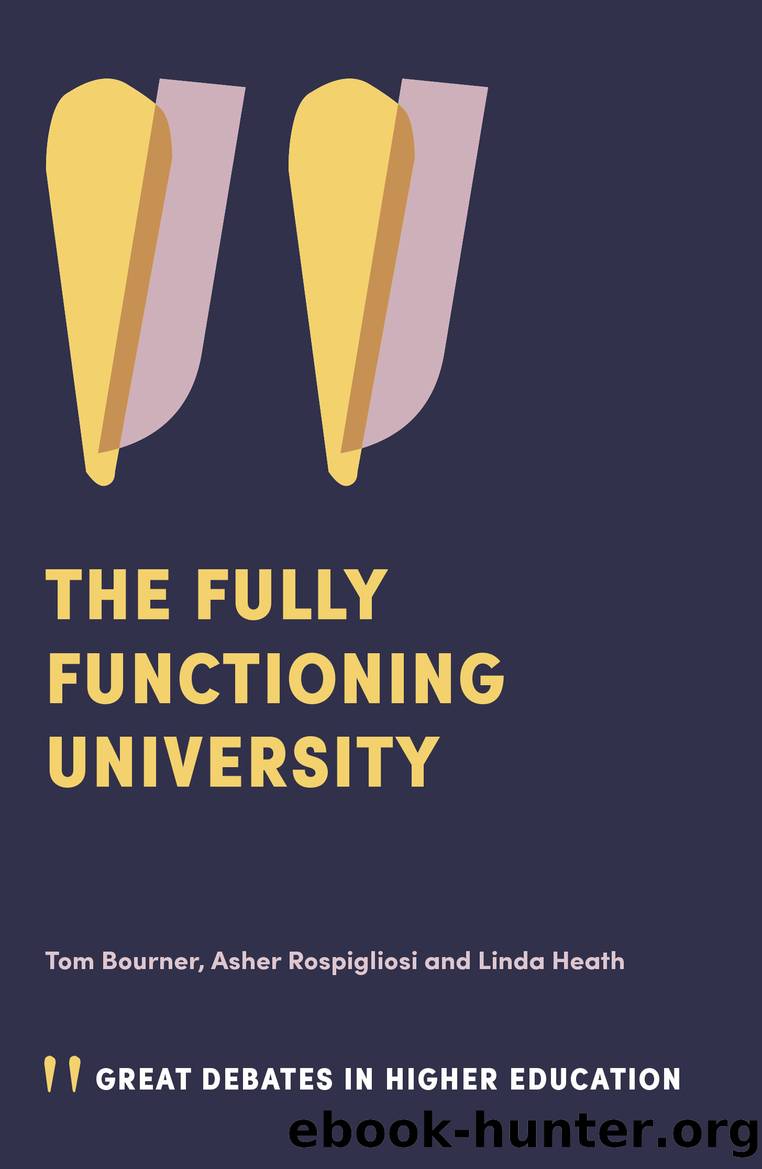The Fully Functioning University by Bourner Tom;Rospigliosi Asher;Heath Linda;

Author:Bourner, Tom;Rospigliosi, Asher;Heath, Linda;
Language: eng
Format: epub
Publisher: Emerald Publishing Limited
Published: 2020-02-15T00:00:00+00:00
RESEARCH IN THE FULLY FUNCTIONING UNIVERSITY
For the purposes of this chapter, research is defined as the intentional creation of shared new knowledge. Intentional âbecause we recognise that knowledge can be discovered by happy accident, serendipity or as a by-product of some other process. Creation â is used in preference to the word âdiscoveryâ because we want to include not only âdiscoveryâ but also âinventionâ. Shared â because new knowledge that is not shared does not add to the stock of knowledge available to the world. New â because âre-inventing the wheelâ doesnât add to the stock of knowledge. Knowledge â because research goes beyond merely providing more data. Research is not the same as scholarship, which in this chapter means, following Lewis Elton (1992), the âcritical interpretation of existing knowledgeâ.
The previous chapter addressed the question, âwhat sort of HE would be offered by a university that places value on each part of the tripartite mission in its own right?â In that chapter, we concluded that the sort of HE offered by a fully functioning university would be one that contained a subject-centred part, a student-centred part and a service-centred part. Each of the three categories pertains directly to one part of the tripartite mission, respectively, that is, the advancement of knowledge (which in the academy is largely organised by subject discipline), the advancement of student education and the advancement of society.
The same reasoning can now be extended to research, which in the fully functioning university would contain a subject-centred part, a student-centred part and a service-centred part. That, however, begs the question, do these theoretical categories have empirical significance, that is, âcan we populate the categories of this frameworkâ or is one or more of the categories empty? Can we find at least three non-trivial examples of subject-centred research, student-centred research and service-centred research, respectively? To answer this question, we look at each in turn.
Subject-centred research. This is the research where the primary goal is to make a direct contribution to the advancement of knowledge within subject disciplines. Over the last 200 years, universities have become clear about the sort of research that best meets that goal. It includes, for example:
1. Rigorous research. This is the sort of research that meets the criteria most frequently applied to research reports submitted for publication in peer-reviewed scholarly journals. These include methodological fitness regarding the aims of the research, critical assessment of the research findings and appropriateness of conclusions in the light of the literature in the field and in the light of the findings of the research itself.
2. Basic research. This is fundamental research that is most likely to challenge assumptions within a subject discipline or open up new fields of enquiry. It is the kind of research that may produce a paradigm shift and it is particularly valuable when research within a particular paradigm has encountered clearly diminishing returns.
3. Open research. The advancement of knowledge implies the creation and growth of a pool of knowledge from which all can draw. This,
Download
This site does not store any files on its server. We only index and link to content provided by other sites. Please contact the content providers to delete copyright contents if any and email us, we'll remove relevant links or contents immediately.
The Art of Coaching Workbook by Elena Aguilar(51198)
Trainspotting by Irvine Welsh(21663)
Twilight of the Idols With the Antichrist and Ecce Homo by Friedrich Nietzsche(18632)
Fangirl by Rainbow Rowell(9249)
Periodization Training for Sports by Tudor Bompa(8271)
Change Your Questions, Change Your Life by Marilee Adams(7780)
This Is How You Lose Her by Junot Diaz(6885)
Asking the Right Questions: A Guide to Critical Thinking by M. Neil Browne & Stuart M. Keeley(5775)
Grit by Angela Duckworth(5614)
Red Sparrow by Jason Matthews(5471)
Paper Towns by Green John(5189)
Room 212 by Kate Stewart(5119)
Ken Follett - World without end by Ken Follett(4731)
Housekeeping by Marilynne Robinson(4446)
The Sports Rules Book by Human Kinetics(4385)
Papillon (English) by Henri Charrière(4274)
Double Down (Diary of a Wimpy Kid Book 11) by Jeff Kinney(4268)
The Motorcycle Diaries by Ernesto Che Guevara(4098)
Exercise Technique Manual for Resistance Training by National Strength & Conditioning Association(4071)
